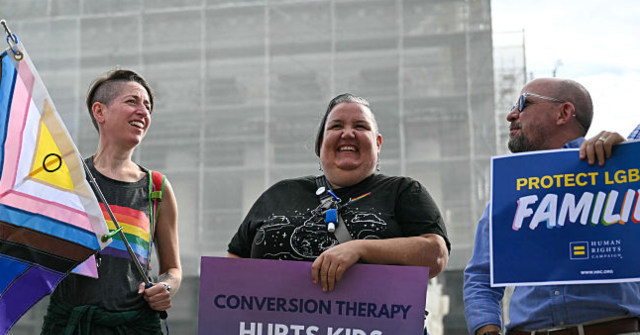The Supreme Court on Tuesday heard arguments in a case challenging Colorado’s law mandating an affirmation-only approach for counselors with regards to sexuality and “gender identity.”
Colorado, along with more than 20 other states, has a law banning “conversion therapy” that was passed in 2019. While the law bans archaic and unethical aversion methods historically associated with conversion therapy, like electroshock therapy, it more broadly outlaws “providing professional services for the purpose of attempting to change a person’s sexual orientation or gender identity, including attempting to change behaviors or expressions of self or to reduce sexual or romantic attractions or feelings toward individuals of the same gender.
Kaley Chiles, a practicing Christian and a licensed counselor who, per court documents, “believes that people flourish when they live consistently with God’s design, including their biological sex,” sued the state over the law. She argues the law bans her from using talk therapy with clients who voluntarily come to her to help them align their sexuality or view of their identity, particularly with regard to minors.
Chiles contends Colorado bans consensual conversations based on the viewpoints expressed, in violation of the Free Speech Clause of the First Amendment, and only allows counselors to push minors toward “gender-affirming care,” which includes social transition, sex change drugs, and surgeries — methods which are experimental, steeped in ideology, and pushed by large medical associations.
The 6-3 majority conservative Supreme Court, which has recently dealt major blows to transgender activists pushing for sex changes for minors and LGTBQ+ propaganda in schools, was asked to decide whether a law that censors certain conversations between counselors and their clients based on the viewpoints expressed regulates conduct or violates the Free Speech Clause. Colorado argued that licensed health professionals in the state are subject to professional discipline for providing treatment to patients that falls “below the accepted standard of care.”
During approximately 90 minutes of oral arguments, the justices appeared skeptical of Colorado’s broadly-worded law and sympathetic to Chiles’ free speech claims, including liberal Justice Elena Kagan.
Justice Samuel Alito was most persistent in his criticism of Colorado Solicitor General Shannon Stevenson’s argument. He first noted that the Court had rejected a similar argument in 2018 in a case surrounding a California law that forced pro-life pregnancy centers to provide information about obtaining abortions.
Alito also presented a hypothetical situation to Stevenson and indicated he thinks the law may engage in viewpoint discrimination. He said:
One viewpoint is the viewpoint that a minor should be able to obtain talk therapy to overcome same-sex attraction, if that’s what or he or she wants, and the other is the viewpoint that the minor should not be able to obtain talk therapy to overcome same sex attraction, even if that is what he or she wants. Looks like blatant viewpoint discrimination.
Stevenson responded by claiming that both scenarios would be permissible under the law because the counselor in the hypothetical scenario was not looking to “change sexual orientation.”
Justice Kagan pressed the point further, presenting Stevenson with a similar hypothetical and remarking, “seems like viewpoint discrimination in the way we would normally understand viewpoint discrimination.”
In another exchange, Alito pointed out that “standards of care” pushed in the past by the medical establishment have sometimes ended up being catastrophically wrong.
“The medical consensus is usually very reasonable, and it’s very important,” Alito said. “But have there been times when the medical consensus has been politicized, has been taken over by ideology?”
Stevenson replied that politicized medicine is “certainly a concern,” but said such evidence was not in the record for the case.
“Isn’t that a reason to apply First Amendment scrutiny when what’s being regulated is pure speech and not just saying medical standard of care, medical consensus?” Alito asked, before referencing previous widespread support from the scientific community for eugenics and placing people with Down Syndrome in mental institutions.
RELATED: Supreme Court to Rule on Trump’s Executive Power, Tariffs, Trans Athletes and More in Highly Consequential Term
In an exchange with Justice Neil Gorsuch, Stevenson admitted the law would prohibit Chiles from trying to help a voluntary client accept their biological reality, ultimately giving Chiles standing to sue.
“But if….she wishes to help clients who voluntarily come and — with the desire to change their behaviors, expressions, attractions, and identity, then that, that would give her standing, wouldn’t it?” Gorsuch questioned.
“Identity, yes,” Stevenson answered.
“Okay. So that settles the standing question,” liberal Justice Sonia Sotomayor chimed in.
Several justices expressed during oral arguments that they may remand the case back to lower courts for consideration under a heightened form of First Amendment scrutiny, which would not strike the law down, but would leave it open to further litigation.
The case is Chiles v. Salazar, No. 24-539 in the Supreme Court of the United States.
Katherine Hamilton is a political reporter for Breitbart News. You can follow her on X @thekat_hamilton.
Read the full article here


